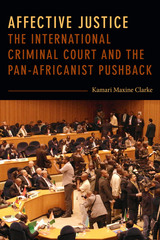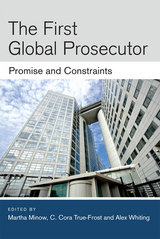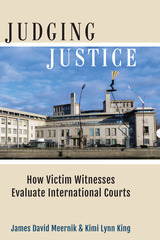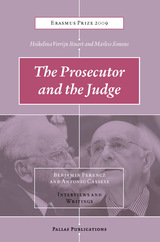5 books about International criminal courts

Affective Justice
The International Criminal Court and the Pan-Africanist Pushback
Kamari Maxine Clarke
Duke University Press, 2019
Since its inception in 2001, the International Criminal Court (ICC) has been met with resistance by various African states and their leaders, who see the court as a new iteration of colonial violence and control. In Affective Justice Kamari Maxine Clarke explores the African Union's pushback against the ICC in order to theorize affect's role in shaping forms of justice in the contemporary period. Drawing on fieldwork in The Hague, the African Union in Addis Ababa, sites of postelection violence in Kenya, and Boko Haram's circuits in Northern Nigeria, Clarke formulates the concept of affective justice—an emotional response to competing interpretations of justice—to trace how affect becomes manifest in judicial practices. By detailing the effects of the ICC’s all-African indictments, she outlines how affective responses to these call into question the "objectivity" of the ICC’s mission to protect those victimized by violence and prosecute perpetrators of those crimes. In analyzing the effects of such cases, Clarke provides a fuller theorization of how people articulate what justice is and the mechanisms through which they do so.
[more]

The First Global Prosecutor
Promise and Constraints
Martha Minow, C. Cora True-Frost, and Alex Whiting, editors
University of Michigan Press, 2015
The establishment of the International Criminal Court (ICC) gave rise to the first permanent Office of the Prosecutor (OTP), with independent powers of investigation and prosecution. Elected in 2003 for a nine-year term as the ICC’s first Prosecutor, Luis Moreno Ocampo established policies and practices for when and how to investigate, when to pursue prosecution, and how to obtain the cooperation of sovereign nations. He laid a foundation for the OTP’s involvement with the United Nations Security Council, state parties, nongovernmental organizations, victims, the accused, witnesses, and the media.
This volume of essays presents the first sustained examination of this unique office and offers a rare look into international justice. The contributors, ranging from legal scholars to practitioners of international law, explore the spectrum of options available to the OTP, the particular choices Moreno Ocampo made, and issues ripe for consideration as his successor, Fatou B. Bensouda, assumes her duties. The beginning of Bensouda’s term thus offers the perfect opportunity to examine the first Prosecutor’s singular efforts to strengthen international justice, in all its facets.
[more]

Judging Justice
How Victim Witnesses Evaluate International Courts
James David Meernik and Kimi Lynn King
University of Michigan Press, 2019
Some injustices are so massive, so heinous, and so extraordinary that ordinary courts are no longer adequate. The creation of international courts and tribunals to confront major violations of human rights sought to bring justice to affected communities as well as to the entire world. Yet if justice is a righting of the imbalance between what has happened and what is reflected in the law, no amount of punishment and no judgment could compensate for that suffering and loss.
In order to understand the meaning of justice, James David Meernik and Kimi Lynn King studied the perspective of witnesses who have testified before the International Criminal Tribunal for the Former Yugoslavia (ICTY). Using a unique survey, Meernik and King look at the identity of the victims and their perception of the fairness of ICTY. Because of the need to justify the practical and emotional difficulties involved in testifying before an international tribunal, witnesses look not just to the institution to judge its effectiveness, but also to their own contribution, by testifying effectively. The central elements of the theory Meernik and King develop—identity, fairness, and experience—transcend specific conflicts and specific countries and are of importance to people everywhere.
In order to understand the meaning of justice, James David Meernik and Kimi Lynn King studied the perspective of witnesses who have testified before the International Criminal Tribunal for the Former Yugoslavia (ICTY). Using a unique survey, Meernik and King look at the identity of the victims and their perception of the fairness of ICTY. Because of the need to justify the practical and emotional difficulties involved in testifying before an international tribunal, witnesses look not just to the institution to judge its effectiveness, but also to their own contribution, by testifying effectively. The central elements of the theory Meernik and King develop—identity, fairness, and experience—transcend specific conflicts and specific countries and are of importance to people everywhere.
[more]

The Prosecutor and the Judge
Benjamin Ferencz and Antonio Cassese, Interviews and Writings
Heikelina Verrijn Stuart and Marlise Simons
Amsterdam University Press, 2009
The prestigious Praemium Erasmianum 2009 was awarded to Benjamin Ferencz and Antonio Cassese, who embody the history of international criminal law from Nuremberg to The Hague. The Prosecutor and the Judge is a meeting with these two remarkable men through in depth interviews by Heikelina Verrijn Stuart and Marlise Simons about their work and ideas, about the war crimes trials, human cruelty, the self-interest of states; about remorse in the courtroom, about restitution and compensation for victims and about the strength and the limitations of the international courts.
[more]

Travesty
The Trial of Slobodan Milosevic and the Corruption of International Justice
John Laughland
Pluto Press, 2007
In 2006, Slobodan Milosevic died in prison in the Hague during a four-year marathon trial for war crimes. John Laughland was one of the last Western journalists to meet with him. Laughland had followed the trial from its beginning and wrote extensively on it in the Guardian and the Spectator, challenging the legitimacy of the Yugoslav Tribunal and the hypocrisy of "international justice."
In this short book, Laughland gives a full account of the trial---the longest trial in history---from the moment the indictment was issued at the height of NATO's attack on Yugoslavia to the day of Milosevic's mysterious death in custody. "International justice" is supposed to hold war criminals to account, but---as the trials of both Milosevic and Saddam Hussein show---the indictments are politically motivated and the judicial procedures are irredeemably corrupt. Laughland argues that international justice is an impossible dream and that such show trials are little more than propaganda exercises designed to distract attention from the war crimes committed by Western states.
"Study this story. . . . The truth is hard to find, but in John Laughland we are fortunate to have a man blessed with the desire to find the truth."
---Ramsey Clark, from the Foreword
In this short book, Laughland gives a full account of the trial---the longest trial in history---from the moment the indictment was issued at the height of NATO's attack on Yugoslavia to the day of Milosevic's mysterious death in custody. "International justice" is supposed to hold war criminals to account, but---as the trials of both Milosevic and Saddam Hussein show---the indictments are politically motivated and the judicial procedures are irredeemably corrupt. Laughland argues that international justice is an impossible dream and that such show trials are little more than propaganda exercises designed to distract attention from the war crimes committed by Western states.
"Study this story. . . . The truth is hard to find, but in John Laughland we are fortunate to have a man blessed with the desire to find the truth."
---Ramsey Clark, from the Foreword
[more]
READERS
Browse our collection.
PUBLISHERS
See BiblioVault's publisher services.
STUDENT SERVICES
Files for college accessibility offices.
UChicago Accessibility Resources
home | accessibility | search | about | contact us
BiblioVault ® 2001 - 2024
The University of Chicago Press









